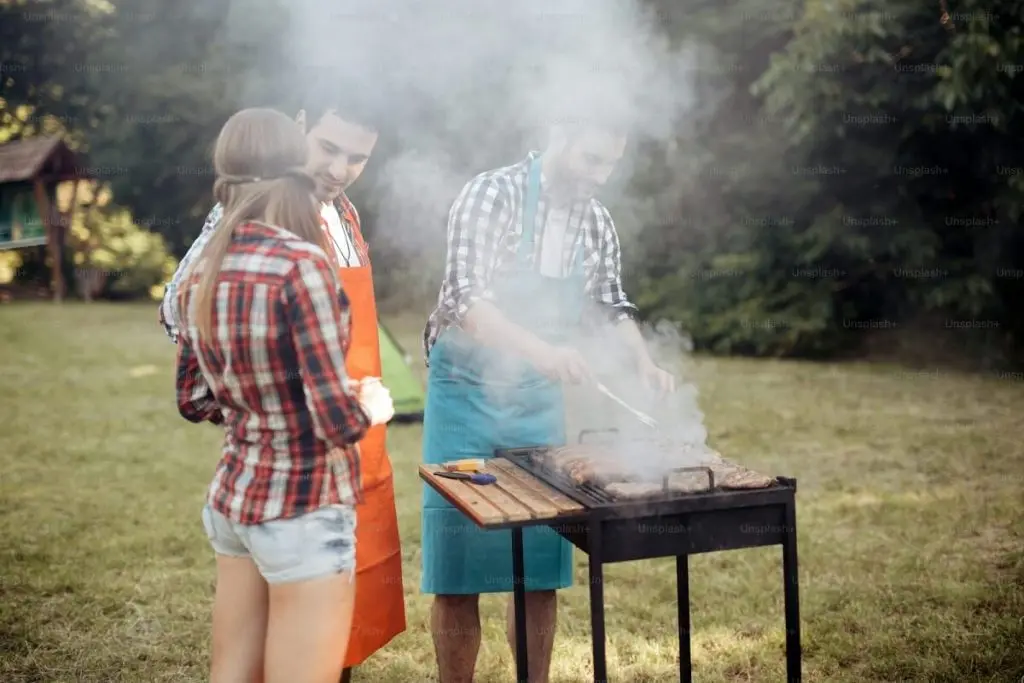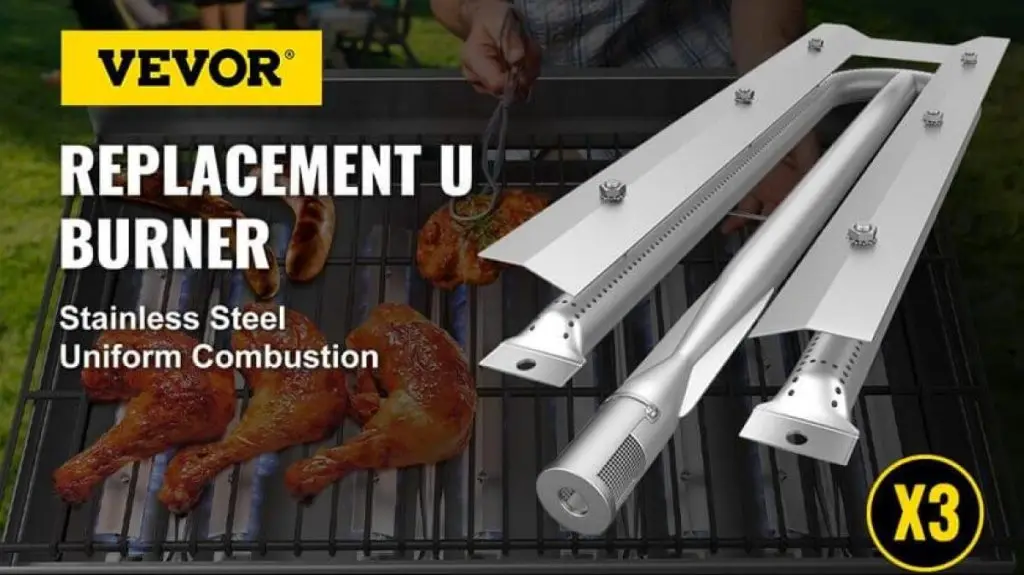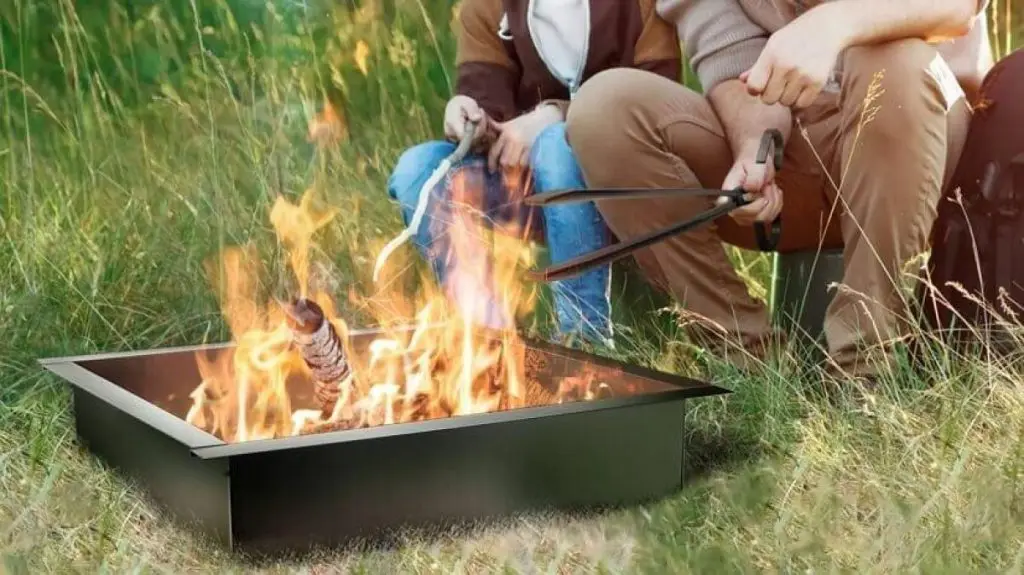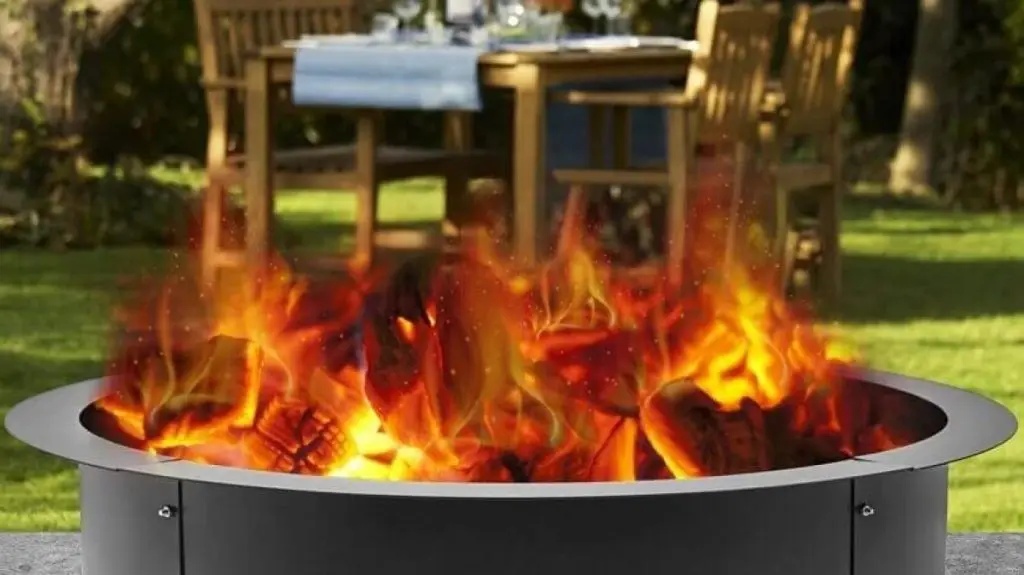Grilling has always been part of the culture when it comes to food preparation. It is valued for its proficiency in giving food a smoky flavor. It is most suitable for parties, camping, and other social functions that bring together families and friends. But with the various categories of grills, what should one opt for? Should it be charcoal, gas, electric, or pellet? And each offers a different experience.
Are you ready to discover which of the grills is perfect for you? Well, let’s get the ball rolling and see what’s out there. So, no matter if you’re an experienced griller, or have never touched a grill in your life, there’s a grill made for you.
Table of contents
Charcoal Grills: The Classic Choice
Are you seeking to take your grilling to the next level? Find out why people prefer charcoal grills since these are the grills that have taken flavor chasers to another level.
How Charcoal Grills Work
Charcoal grills burn charcoal briquettes or lump charcoal to generate heat for cooking. The charcoal is set aflame to generate a grill base of ember, and heat is produced above by radiating up from the ember in order to cook the food on the grill grate. This method enables foods to be subjected to high-heat servings and even results in smoky attributes to foods.
Pros of Charcoal Grills
- Charcoal grills give foods a smoky taste that some people love compared to those who use the gas grill.
- They can heat to higher temperatures than the gas grills which are suitable for charring steaks or browning poultry skin.
- There are two kinds of charcoal: briquettes and lump; the former gives steady heat while the latter is hot and fast-burning.
Cons of Charcoal Grills
- They require time to preheat and manage the fire.
- Ashes need to be disposed of after each use.
Best Foods for Charcoal Grilling
Charcoal grills excel in cooking foods that benefit from intense heat and smoky flavor:
- Achieve a perfect sear and smoky crust.
- Juicy patties with a flavorful char.
- Grilling with charcoal brings out the natural flavors of foods and imparts a definite smoky character.
They are preferred for the peculiarity of imparting foods such as meats and vegetables a rich smoky flavor, making them ideal for barbecues and other similar practices in outdoor cookery.
VEVOR 23-inch Portable Charcoal Grill is one of those models that are both portable and functional for traveling and outdoor cooking. It is endowed with a foldable design, and it also has a large surface to cook your food, and also foldable food trays to grill your food.
Gas Grills: Convenience Meets Flavor
A gas grill is an external cooking tool that is run by propane or the good old natural gas and not charcoal or even wood. It can be further classified according to the kind of gas that is employed, and the two are known as propane grill and natural gas grill.
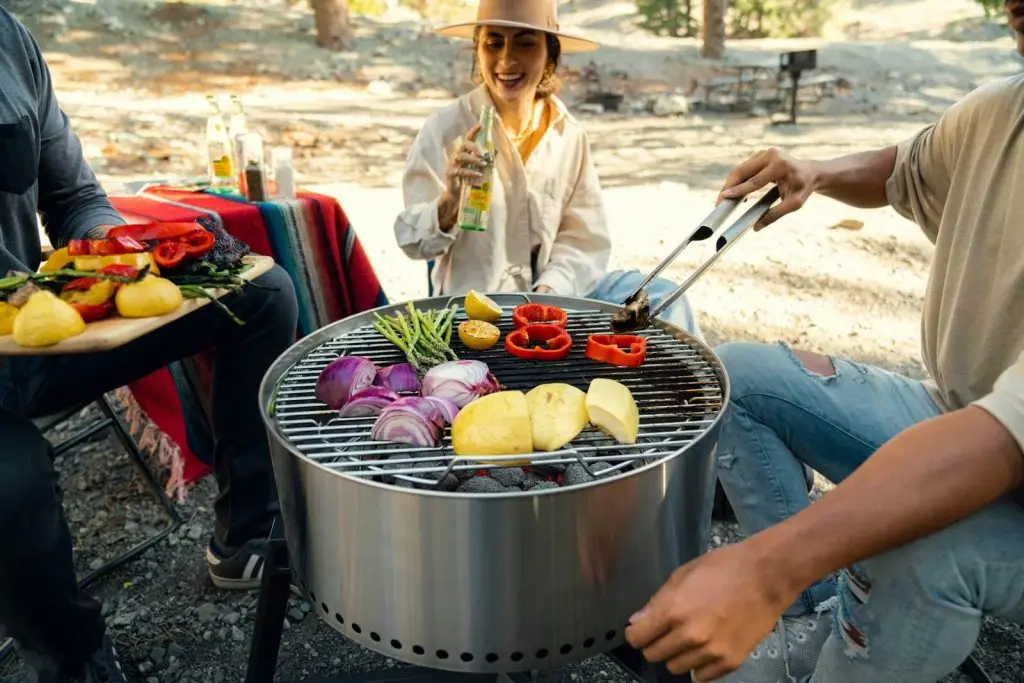
Natural Gas vs. Propane Grills
Propane and natural gas grills offer convenience and efficiency, yet they differ in fuel source and setup. Propane grills use refillable tanks, offering mobility but requiring regular refills. In contrast, natural gas grills connect to residential gas lines, providing a constant fuel supply but requiring installation.
While natural gas grills often cost more upfront due to installation needs, they generally incur lower ongoing fuel costs than propane. Both types provide nearly the same level of heat and cook food to near-equivalent standards.
Advantages and Disadvantages of Gas Grills
Advantages of Gas Grill:
- Heats up rapidly, often in 10–15 minutes.
- Provides accurate temperature control, allowing you to prepare a variety of meals easily.
- Cleanup is easier because there are no ashes to deal with after grilling.
- More ecologically friendly, producing fewer emissions than charcoal grills.
- Convenient features include side burners and storage space for cooking equipment.
Disadvantages of Gas Grills:
- Can be more expensive than charcoal grills, both initially and in terms of fuel expenditures.
- It lacks the real smokey taste that charcoal grills offer.
- The necessity for a petrol tank makes it less portable.
- Requires a dedicated gas line or propane tank, which may be unavailable in some areas.
- Potential safety risks with gas leaks or faulty hookups.
Features to Look for in Gas Grills
- Invest in quality for longevity and performance.
- Select companies that have the sort of products you desire, that are long-lasting, and have a good reputation for customer care.
- Choose materials such as quality stainless steel for the cookers’ construction to enhance its durability and ability to retain heat.
- Choose additional options such as warming racks, smokers, or rotisseries according to the kind of food preparation that you are going to make.
- Choose the type of cooking area in relation to its use and your capacity to incorporate an outdoor kitchen.
- Select depending on the mobility and the appearance of the location where you are going to place it.
- Ensure that the design of your outdoor kitchen complements the other arrangements that you are making.
Best Foods for Gas Grilling
Here are some of the best foods for gas grilling:
- Hamburgers
- Steak
- Fruit
- Chicken
- Sausages
- Vegetables
- Potatoes
- Pizza
Pellet Grills: The Tech-Savvy Option
Pellet grills can be used to smoke, grill, bake, and braise foods. Almost every conventional kind of cooking can be done in a pellet grill.
How Pellet Grills Function
Pellet grills are powered entirely by 100% all-natural hardwood pellets since it is the principal fuel supply. These pellets are kept in a hopper and are pushed into the cooking chamber by means of an auger that is operated by electricity.
Once inside, the pellets start undergoing a process of combustion; this warms up the chamber. Intake fans help in the circulation of heat and smoke in the stove in a similar manner as required during convection. This configuration makes it possible to set temperatures ideal for both low and slow smoking and hot grilling.
Benefits and Drawbacks of Pellet Grills
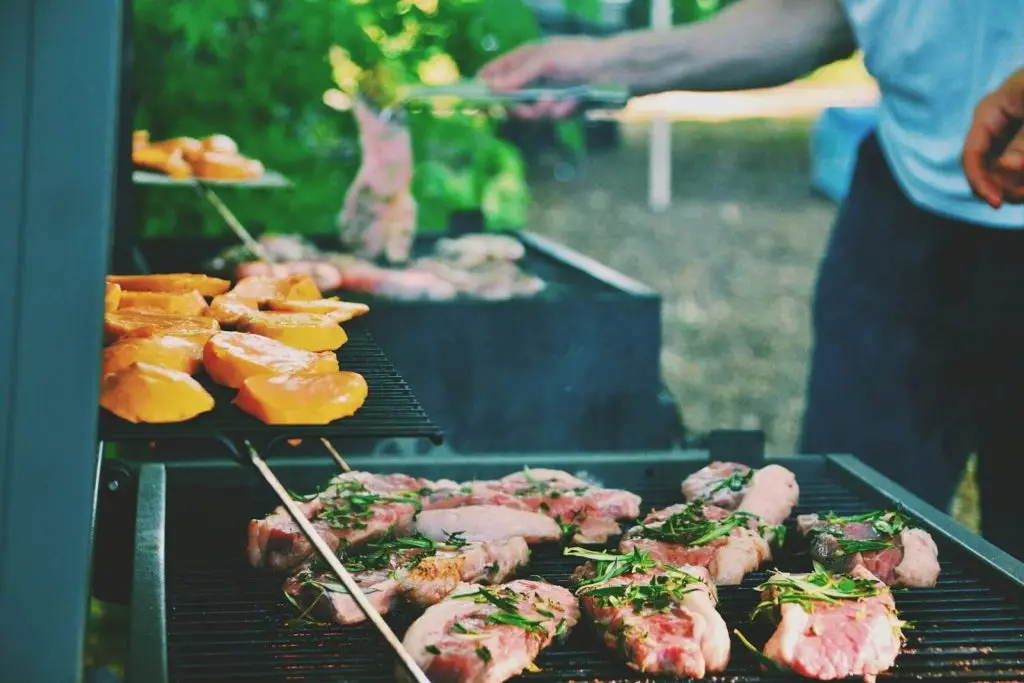
Benefits of Pellet Grills:
- It uses compressed hardwood briquettes for different tastes.
- Has adjustable temperature controls, usually ranging from 82 °F to 260 °F.
- Serves as a smoker, grill, roaster, and baker.
- Automated pellet feeding and temperature control simplify cooking processes.
- Produces minimal ash (less than 1% of pellet weight), reducing cleanup time.
Drawbacks of Pellet Grills:
- An electric power source is required to operate the drill and fans.
- Higher upfront investment compared to basic charcoal or gas grills.
- Regular cleaning of the auger, hopper, and cooking chamber is necessary.
- Limited by the need for electricity and the bulkier design compared to portable charcoal or gas grills.
Ideal Foods for Pellet Grilling
The pellet grill is ideal for cooking low and slow items such as brisket, pork shoulder (shown), or a side of salmon because it produces results similar to those obtained through sous vide cooking.
Smart Features in Modern Pellet Grills
Here are the smart features of modern pellet grills:
- It allows remote monitoring and control via smartphone apps.
- Provide precise temperature settings and cooking timers.
- Monitor internal food temperatures for perfect doneness.
- It enables recipe downloads and cooking tips for enhanced user experience.
- Maintains consistent heat levels for reliable cooking results.
Electric Grills: Urban Grilling Solution
How Electric Grills Work
Electric grills use heating elements powered by electricity to cook food. They typically feature a grate or plate where food is placed directly over the heat source. Temperature control is managed via a thermostat or adjustable settings, ensuring even cooking.
Pros and Cons of Electric Grills
Pros
- Convenient and easy to use, no need for charcoal or propane.
- Suitable for indoor use in apartments or condos.
- Heat up quickly and maintain consistent temperatures.
Cons
- May not achieve the same smoky flavor as charcoal grills.
- Limited cooking surface compared to traditional grills.
- Dependency on electricity limits portability.
Best Scenarios for Using Electric Grills
Electric barbecues are ideal for urban dwellers with little outside space. These are great for use on balconies, patios, when camping, or in residences that do not allow open flames or gas barbecues. It is a convenient way to grill meals without having to go through the laborious steps that traditional techniques need.
Indoor vs. Outdoor Electric Grills
Indoor
- Designed for use in kitchens or well-ventilated areas.
- Often compact and easier to store.
- Safety features like cool-touch handles are common.
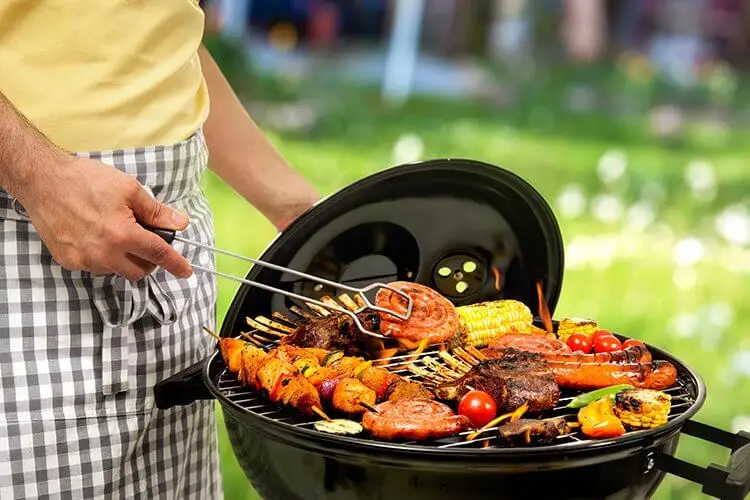
Outdoor
- Larger cooking surfaces for larger gatherings.
- Weather-resistant construction.
- Some models offer portability with detachable stands or wheels.
Portable Grills: Grilling on the Go
Portable grills come in many shapes and sizes and use various fuel sources, such as gas, charcoal, and wood pellets. Whether you’re camping, at the beach, or tailgating, there’s a portable grill perfect for you.
Prices vary based on fuel source and brand. A small portable gas grill can start at $50, while portable charcoal grills can be even cheaper. Advanced portable pellet grills begin in the low hundreds, offering an even grilling experience.
Types of Portable Grills
Tabletop Grills
Compact and easy to set up on any flat surface, ideal for small gatherings.
Camping Grills
Designed for durability and portability, perfect for cooking in the great outdoors.
Hibachi Grills
Traditional Japanese style, known for their simplicity and intense heat.
Features to Consider in Portable Grills
When choosing a portable grill, what features matter most to you? Think about:
- Fuel Source: Do you prefer gas, charcoal, or wood pellets? Each has its unique flavor and convenience.
- Size and Weight: How easy is it to carry? Will it fit in your car or backpack?
- Cooking Surface: How much food can it handle at once? Are you grilling for a small group or a big crowd?
Best Foods for Portable Grilling
Portable grills are perfect for hot dogs, burgers, and vegetables, but did you know some can handle a whole rack of ribs or a spatchcocked chicken? What’s your go-to grilling recipe?
Pros and Cons
Pros:
- Ideal for grilling on the go
- Perfect for tailgates, beach parties, picnics, and camping trips
Cons:
- Limited cooking space compared to standard-sized grills
Smokers: For the Low and Slow Enthusiast
A barbecue smoker is a grill that cooks meat by smoking it with indirect heat. This method, which includes types like pellet grills, cooks food slowly at lower temperatures, making it perfect for pork and brisket.
Smokers vary in cost and fuel type. Small charcoal smokers might be under $100, while high-quality pellet grills can go beyond $2000. Wood pellets are a favorite for adding that perfect smoky flavor.
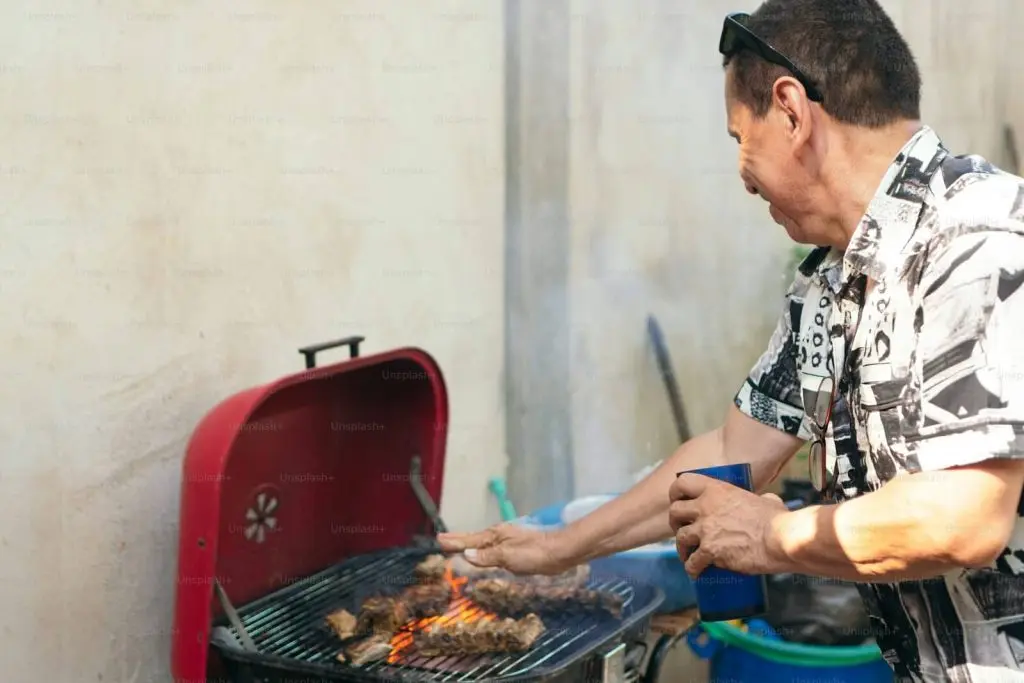
Types of Smokers
Offset Smokers: Classic design with a separate firebox, perfect for those who love traditional smoking methods.
Vertical Smokers: Space-efficient and ideal for small spaces, they use vertical heat flow for even cooking.
Box Smokers (Vault Smokers): These offer great heat retention and are perfect for larger cuts of meat.
Which type of smoker do you think would suit your needs best?
Benefits of Using a Smoker
Why choose a smoker over a regular grill? Smokers are known for:
- The smoky flavor is unmatched, especially with wood pellets adding a natural taste.
- Slow cooking breaks down the meat fibers, making it incredibly tender.
- You can smoke a variety of meats and even vegetables.
Popular Foods for Smoking
Smokers excel themselves when it comes to barbecued meats. Pulled pork, beef brisket and chicken are the most common ones. Just think about how that rich, smoky fragrance would smell grilling those delicious foods in your backyard!
VEVOR’s 24” Ceramic Barbecue Grill Smoker is highly recommended for enthusiasts. Its design also allows flexibility, toughness and accurate heat regulation that makes it capable of delivering quality results for all your smoking purposes. This type of grill is large and is made of ceramic for high-end cooking; it is suitable for smoking pulled pork, briskets, and chicken.
Recommended For Your Project
Choosing the Best Types of Grill for You
Selecting a grill is very crucial, there are several factors to put into consideration to meet your desires. Let’s discuss the main points to provide you with the necessary information and decide what type of grill is best.
Factors to Consider
- Available Space: Choice may be dictated by space. For instance, you have the pellet grills and smokers, which will occupy much space compared to the small and portable manner of the gas grill that is suitable for a small area.
- Fuel Preference: Each kind of fuel has some benefits in their own manners. Charcoal grills provide sticking to smoke, while gas grills are fast and convenient, and pellet grills feature an even heat with flavor control.
- Cooking Style: The kind of grilling that is required will depend on the kind of cooking that is being done. While gas grills are ideal for quick grilling, then pellet grills and smokers are ideal for slow grilling and smoking.
- Budget: The cost of grills can be significantly different. The charcoal grills can be affordable to the extent of costing around $100 while the expensive pellet grills can cost up to $2000. Another cost also must be considered for example extended fuel costs in the future.
Matching Grill Types to Specific Needs
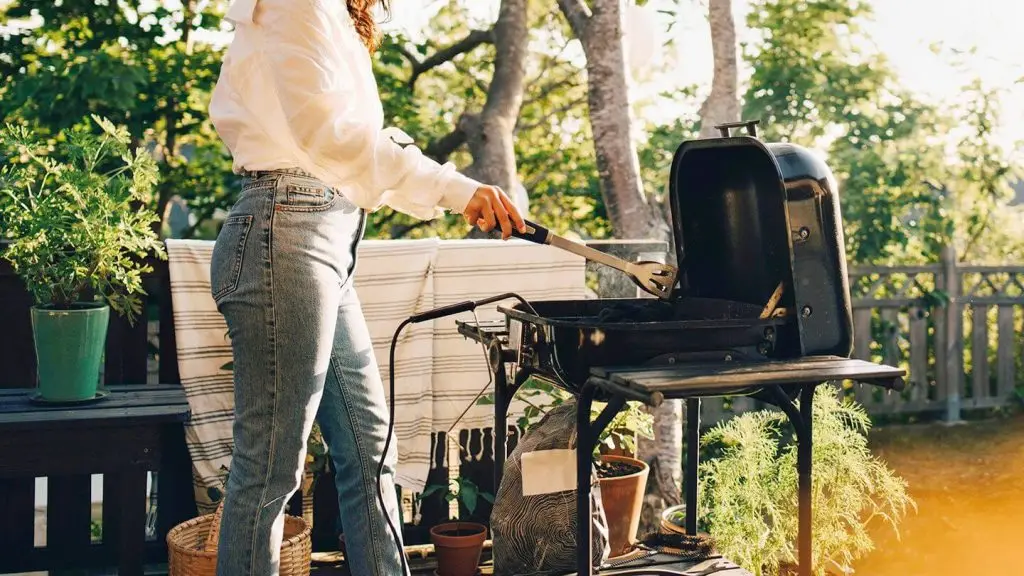
- Charcoal Grills: They are relatively cheap, which makes them ideal for common users who are not willing to spend so much on their grills.
- Gas Grills: Ideal for easy & swift preparation with minimum fuss. They heat up quickly and are pretty convenient.
- Pellet Grills: These are flexible and provide accurate temperature regulation; therefore, they are ideal for passionate grillers who enjoy exploring different grilling styles. However, they demand higher initial capital.
- Portable Grills: Recommended for users who frequently barbecue on the go.
Conclusion
Look into several grill types to fit your demands, both in terms of lifestyle and food preferences. There is a grill to improve your outdoor cooking experience, regardless of your preference for the smokey intensity of charcoal, the simplicity of electricity, the convenience of gas, or the diversity of pellets. Select wisely to savor every grilled meal to the fullest!

